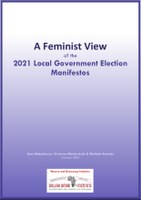Press Release: A Feminist View of Election Manifestos
The Womxn and Democracy Initiative at the Dullah Omar Institute released a report today that analysed the election manifestos of the top performing parties in the previous local government elections - the ANC, the DA and the EFF, as well as the women-led Ikhwezi Political Movement (IPM) to assess what the parties have to say and what promises have been made beyond what is commonly referred to as women’s issues.
The analysis applies a feminist lens to the parties’ approaches to unemployment, land and home ownership, social security, education and health and forms part of an ongoing project on feminist governance to provide information against which to hold parties and local government accountable after the elections.
“Often we see political parties and manifestos only dealing with women in terms of gender-based violence. We see this as a huge gap because violence against women is a symptom of an unequal society and only responding to women from that perspective is inadequate,” says Vivienne Mentor-Lalu.
“Where political parties do address gender issues in their manifestos: whether it be women or violence against women, you can’t see how they are going to resource or implement it, and so it feels like lip service and not a real attempt to address the layers of inequality and exclusion faced by women in South Africa,” she says.
The analysis is part of a larger project to provide feminist analysis of political parties and government to see how they have ranked gender in their work and priorities. Previous projects by WDI include an analysis of party manifestos during the 2019 national elections and further analysis of various government departments.
Some of the key findings from the 2021 analysis of party manifestos for the local government elections include:
- All parties have failed to address the issue of women’s invisible and free labour. In the context of local government competencies, this means that they have not demonstrated any understanding of, or priority, in terms of the way that failures and disruptions in the supply of electricity or water to a home result in the women and girls in that home shouldering additional tasks and stressors, which deeply impacts on their wellbeing and ability to participate in society on equal terms as men.
- On citizen participation in local government processes, only the EFF’s manifesto provides any mention of strengthening the local measures in this regard. Both the DA and the ANC rely in their manifestos on the assumption that the current mechanisms are sufficient.
- On the whole, the ANC is very weak on how it deals with gender and intersectionality. Their section on gender is tacked on, and it offers one ‘catch all’ line in one section promising that the specific needs of various groups of people namely, women, people with disabilities, the elderly and children will be addressed in infrastructure development, basic services, housing and local economic development.
- The DA does not, deliberately we think, identify womxn or gender in their manifesto, pointing to a genderblind position with no recognition of structural and intersectional contexts for womxn. On that basis, they don’t begin to address the issues that maintain the status quo of the entrenched inequalities experienced by women or other groups on the margins, and this manifesto is unlikely to significantly change the lives of those womxn.
“Manifestos can only tell us what political parties want us to hear,” says Mentor-Lalu. “We tried to assess the different question of populism and lip service in terms of what’s been promised, if the commitments are backed up by a depth of understanding of the context of women, if they appear realistic given the context on any particular issue and if they are specific and targeted.”
While the WDI concedes that manifestos are not policies and present a blunt tool for holding political parties to account, the institution believes that the more citizens can engage with political parties on their pre-election promises and call out parties to adapt their positions to communities’ needs, the more useful manifestos become. “Once a party gains power, we can use the manifestos along with other methods to hold them accountable,” says Mentor-Lalu.
“Our analysis is not trying to tell people how to vote, because you can’t use the content of manifestos alone to make that decision. Other factors like the party’s approach to governance, and so on have to be considered to,” says Mentor-Lalu.
For comment or enquiries contact:
- Vivienne Mentor-Lalu – 082 494 0788
- Motlatsi Komote – 072 872 2200
ABOUT THE ORGANISATION: The Womxn and Democracy Initiative is based at the Dullah Omar Institute at the University of the Western Cape and tracks feminist governance aims to increase a political focus on realising womxn’s and gender rights. The project aims to increase public pressure on political office bearers and departments to be more responsive to a feminist agenda for feminist leadership.

